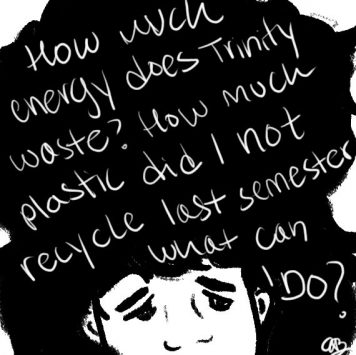YASSINE HALILA ’18
CONTRIBUTING WRITER
This open letter was written on behalf of the first-year seminar “Cycling, Sustainability, and the City of Hartford” offered in Fall 2014. It criticizes Trinity’s environmental policy, or the complete absence thereof. The shortcomings it identifies are still relevant now, two years later.
Dear President BergerSweeney,
This letter is written on behalf of the first-year seminar FYSM 157 “Cycling, Sustainability and the City of Hartford.” As you enter your fourth month as president of Trinity College, we would like to take this opportunity to commend the energetic leadership you have demonstrated and we hope that the subject of our letter here will enjoy the same level of attention and endeavor as the other initiatives you have prompted in such a short period of time.
We are aware of the challenges and difficulties inherent in the monumental transition of a college presidency handover, and we reckon that there is a learning curve in acclimating to a new place.
We would like to draw your attention to the fact that former President James Jones had signed the American College and University President’s Climate Commitment (ACUPCC) in Fall 2007. The ACUPCC, a pact between the leaders of 684 institutions, with text viewable online, binds Trinity College to certain measures designed to render the campus more sustainable, energy-efficient, and eco-friendly with the ultimate purpose of achieving climate neutrality by a set date.
In our explorations and research, we have discovered that the College is very far from satisfying the requirements outlined by the ACUPCC. In fact, lest a miracle occurs, our institution is not holding, and will not hold, its end of the bargain. For example, the ACUPCC entails a 10 percent reduction in our GHG emissions by the end of 2020 (compared to the 2008 baseline), as well as setting a specific target date for the achievement of climate neutrality within two years of the signature of the commitment. A target date for climate neutrality still has yet to be set seven years after our acceptance of the ACUPCC. Our GHG emissions have increased from 17,409 metric tons of CO2 in 2008 to 22,423 metric tons of CO2 in 2013 (self-reported Progress Reports are available online).
These are but two small examples of our evident failure in abiding to our word. Perhaps more importantly, it is a general reflection of Trinity’s severe disinterest, as a community and an institution, with regard to sustainability, climate change, and simply respect for the environment and nature. We observe practices that are antithetical to the values that are integral in the ACUPCC. From Mather Hall food waste, inefficient heating, and dependence on motored forms of transportation to a tendency to leave lights and machines on even when they are not in use, we feel that Trinity is a wasteful and inconsiderate community and that no sufficient effort is being taken to reverse the trend.
Signing the ACUPCC was undoubtedly a genuine reflection of our intent to become a more responsible and sustainable campus. Unfortunately, it is apparent now in light of our disregard of the pact, that our signature of the ACUPCC was more of a publicity stunt –– an easy way to improve our position in the “rankings.” We recommend retracting our signature, admitting our failure and starting fresh, more realistic efforts to make our campus more sustainable.
We would have liked to expound further upon the necessity of combating climate change, the ACUPCC, its requirements and our efforts (or lack thereof) to implement it, strategies to better ourselves as a sustainable community and the benefits that Trinity would reap as a result. For the sake of brevity, we will end our letter here, hoping that you will elevate this issue to be a strategic priority.
Is Trinity Eco-friendly? Trinity Fails to Meet Challenge of Sustainability





+ There are no comments
Add yours